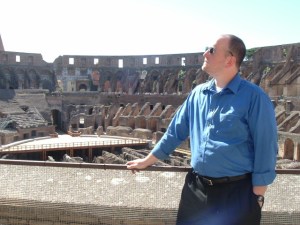“As someone who has benefited from the struggle and sacrifice of people throughout history, I feel that I have a responsibility to give back to future generations,” said Eric Piotrowski, a high school English teacher and Wikipedia editor (User:Scartol) who dedicates his time to improving content and expanding articles.

The 36-year old native of Gainesville, Florida, views his work on Wikipedia as an important part of fulfilling his responsibility to his forbears and to his vision of democratic change. Piotrowski also says he relishes the opportunity to contribute to the free knowledge base for historical figures such as Honoré de Balzac, Emma Goldman, Chinua Achebe, and Harriet Tubman.
Although he obviously derives a great deal of personal satisfaction from his work on Wikipedia—which includes 13 Featured Articles, 4 Good Articles, and more than 10,000 edits—Piotrowski also uses Wikipedia in the classroom to help reach his students. He views it in the same educational tradition as Freire, Dewey, Piaget, and Montessori, where the classroom is a place of consensus and teaching is a collaborative act.
“I see myself as PR for the idea of developing your mind intellectually and pushing yourself to get better,” he said.
Piotrowski, who routinely teaches about 30 students, adorns his classroom walls with imagery of the important influences in his life: posters from The Simpsons and from “legendary hip-hop artists” like Run-DMC, Public Enemy, and the Ice Cube ALA Read Poster, a poster about banned books, a tais weaving from East Timor, a picture of Malcolm X, a quote from Kurt Vonnegut, a picture of Liviu Librescu, and a collection of Simpsons toys given to him by various students over the years.
Though he realizes that some of his students disdain the notion that he could find writing and editing Wikipedia fun, and some even ask how much he gets paid to do it, others have been inspired to investigate and learn about various subjects in articles he has written.
“Some kids get it and some don’t,” he said. “It’s simple and common for them to scoff at the open nature of the Wikipedia experiment, but once they dig beneath the surface—or get dragged beneath it by a dogmatic and pedantic English teacher—they recognize how revolutionary the whole enterprise is. I hope someday that they’ll be an active part of the community that has helped me in so many ways.”
Piotrowski knows that many of his teaching peers frown on the use of Wikipedia in the classroom and forbid their students from using it for research projects. That viewpoint, he said, is a gross simplification and not a very “healthy” way to look at what Wikipedia has to offer.
“It’s a great resource—a tool—but it’s not a source for you to cite. It is a way for you to find good sources and to gain an overview and basic understanding of a topic. So start there, but don’t stop there,” he explained. “The Wikipedia community has done an amazing job of putting together a readable, comprehensive, well-cited overview of hundreds of thousands of topics. It’s a collection of filtered information that libraries throughout the world 200 years ago would have given their eyeteeth for.”
Though Piotrowski impacts people through his teaching, blogging, music dabblings, and even an occasional zine, he said his contributions on Wikipedia reach more people than all of his other endeavors combined. “The work I’ve done on Wikipedia has by far been the most significant contribution to other people’s understanding of the things that I feel are important,” he said proudly. “The Harriet Tubman article is easily the most widely accessed article I’ve ever worked on—it’s viewed something like 10,000 times on a regular school day.”
He added: “But the deeper reward for me is knowing that I’m helping curate a comprehensive store of human knowledge and helping someone who wants to know about these amazing people.”
Profile by Darrin Fox, Communications Intern
Interview by Matthew Roth, Global Communications Manager

Can you help us translate this article?
In order for this article to reach as many people as possible we would like your help. Can you translate this article to get the message out?
Start translation